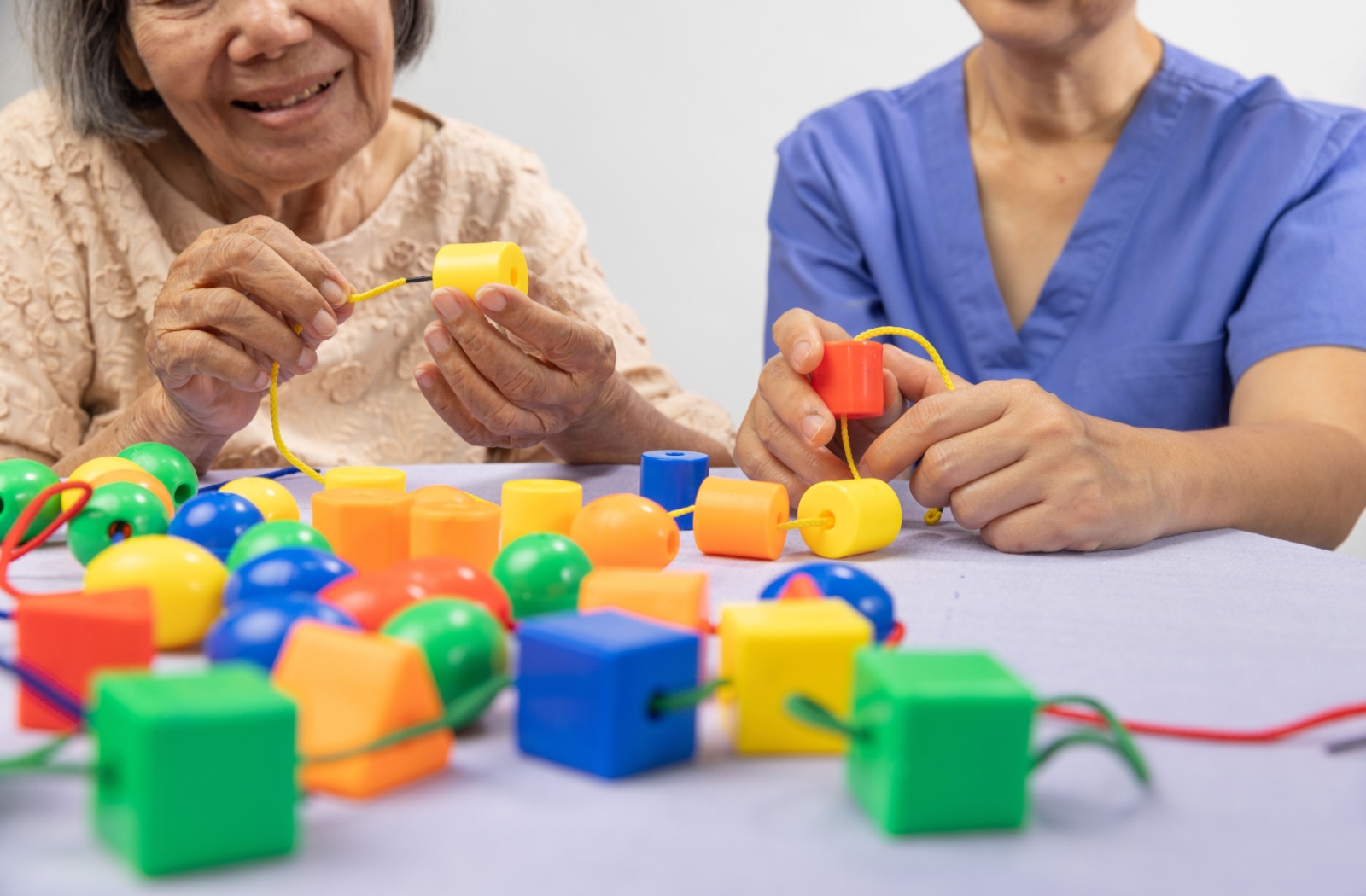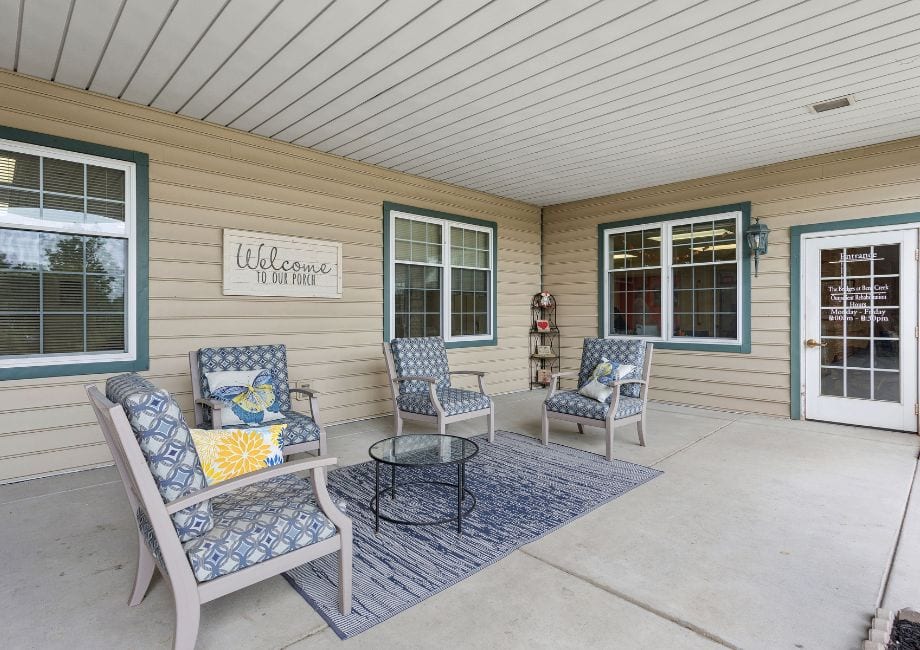Watching a loved one experience memory loss can feel overwhelming. You might notice they repeat questions, forget familiar names, or struggle with daily tasks they once managed easily. These changes often signal dementia, a condition that affects millions of seniors and their families.
Memory care is a specialized form of senior living designed to support individuals with dementia. It offers a safe and structured environment to older adults in need. Memory care focuses on maintaining dignity and quality of life as dementia progresses.
What Is Dementia?
Dementia is an umbrella term for conditions that cause memory loss and cognitive decline. Alzheimer’s disease accounts for most cases, but it isn’t the only type. Other types include vascular dementia, Lewy body dementia, frontotemporal dementia, and more.
Common Signs & Symptoms of Dementia
Early dementia symptoms can be subtle, but they typically worsen over time. Common signs include:
- Memory loss that disrupts daily activities.
- Difficulty planning or solving problems.
- Confusion about time or place.
- Trouble with familiar tasks.
- Changes in mood or personality.
- Misplacing items frequently.
- Poor judgment or decision-making.
These symptoms progress at different rates for each person. Eventually, most people with dementia need additional support with daily living.
How to Support Someone with Dementia at Home
Caring for someone with dementia at home requires patience and adaptability. It helps to create a safe environment by removing tripping hazards and installing grab bars. Establishing consistent daily routines helps, as familiarity reduces the effects of some dementia symptoms.
Communication also becomes increasingly important. Speak slowly and clearly, maintain eye contact, and avoid correcting facts they may misremember. Instead, focus on their feelings and redirect conversations when needed.
How to Know When It’s Time for Additional Help
Several signs indicate home care may no longer be sufficient:
- Safety concerns, such as wandering or leaving appliances on.
- Difficulty managing medications.
- Frequent falls or mobility issues.
- Caregiver burnout or stress.
- Significant behavioral changes or aggression.
When these challenges arise, it may be time to consider professional memory care.
What Is Memory Care?
Memory care is specialized residential care. This lifestyle is designed to help people with Alzheimer’s disease and other forms of dementia. These communities provide 24-hour supervision in secure environments by a team of highly trained caregivers.
Memory care focuses on supporting cognitive abilities rather than physical limitations. The communities feature secure layouts to prevent wandering, specialized group activities, and higher caregiver-to-resident ratios. They’re an invaluable tool when dementia is involved.
What Does Daily Life in Memory Care Look Like?
Memory care communities offer a structured, supportive environment for a person with dementia. These communities prioritize familiar routines and engaging opportunities tailored to each resident’s cognitive needs. In memory care, life is about making every day meaningful and manageable.
Memory care offers:
- Support with daily activities such as dressing and eating.
- Music therapy, gentle exercise, art projects, and reminiscence therapy.
- Consistent schedules in communal dining spaces to encourage interaction.
- Quiet experiences to help residents relax before bedtime.
- Caregivers trained in techniques like validation therapy and redirection to give personalized support to residents living with dementia.
With this thoughtful approach, memory care communities help residents maintain their quality of life while providing peace of mind to their families.
What Are the Benefits of Memory Care?

Memory care offers several advantages over home care or general assisted living:
- Safety and security through secured environments.
- Caregivers trained in understanding dementia-related behaviors.
- Social interactions, which help reduce isolation and depression.
- Support groups and resources to help family members.
- Consistent care to meet each resident’s unique needs
These are key to helping residents every day in memory care.
What to Look for During a Memory Care Community Tour
Choosing the right memory care community for your loved one is a crucial decision. It requires careful consideration and thoughtful questions. To find a community that meets your loved one’s needs, pay attention to:
- The safety of the environment. Look for a homelike atmosphere, clear pathways, and secure outdoor spaces for walking.
- How caregivers engage with residents. Are they respectful, patient, and attentive? Do residents seem active and engaged?
- How well-trained the caregivers are. You can ask about training requirements, turnover rates, and the team-to-resident ratio.
- How the community handles increasing care needs. Some communities support all stages of dementia, while others may require transfers.
During a visit with our community, you can ask about our visiting policies, meal options, and more. By asking the right questions and observing, you can find a community that aligns with your family’s values and provides the right support for your loved one.
Making The Right Choice For Your Loved One
Choosing memory care represents a significant decision for any family. Begin by researching local communities and scheduling tours at multiple locations. You’ll also want to consider factors like location, cost, caregiver qualifications, and available services. This way, you can effectively choose a community that can support your loved one in the way they deserve.
At The Bridges at Bent Creek, our services are designed with kindness and compassion in mind. We provide specialized support that honors the unique needs of those with cognitive disorders like Alzheimer’s or dementia. Contact us today to discover how our community offers safety, professional support, and more to help preserve your loved one’s dignity and quality of life.










